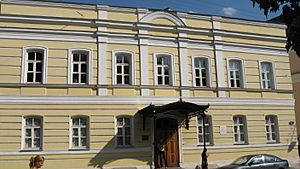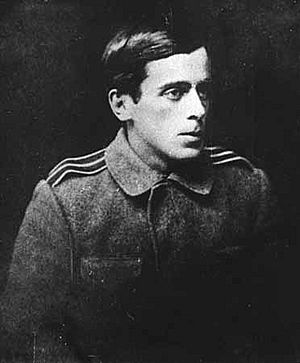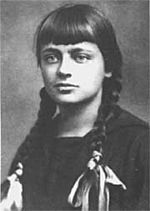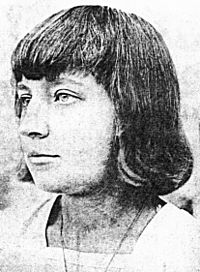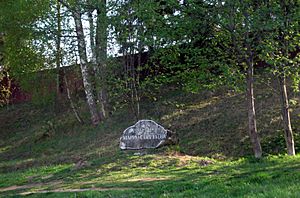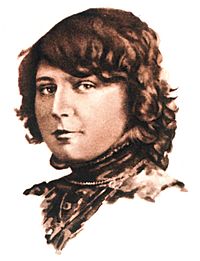Marina Tsvetaeva facts for kids
Quick facts for kids
Marina Tsvetaeva
|
|
|---|---|
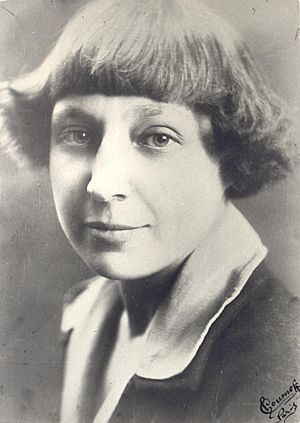
Tsvetaeva in 1925
|
|
| Born | Marina Ivanovna Tsvetaeva 8 October 1892 Moscow, Russian Empire |
| Died | 31 August 1941 (aged 48) Yelabuga, Tatar ASSR, Russian SFSR, Soviet Union |
| Occupation | Poet and writer |
| Education | Sorbonne, Paris |
| Literary movement | Russian symbolism |
| Spouse |
Sergei Efron
(m. 1912) |
| Children | 3, including Ariadna Èfron |
| Signature | |
 |
|
Marina Ivanovna Tsvetaeva (born October 8, 1892 – died August 31, 1941) was a famous Russian poet. Many people think her work is some of the best Russian literature from the 1900s. She lived through the Russian Revolution of 1917 and the difficult times that followed in Moscow.
In 1919, she had to place her daughter Irina in a state orphanage to try and save her from hunger. Sadly, Irina died there. Marina Tsvetaeva left Russia in 1922. She lived with her family in places like Paris, Berlin, and Prague, facing more and more poverty. She returned to Moscow in 1939. Her husband, Sergei Efron, and their daughter, Ariadna, were arrested in 1941. Her husband was executed. Marina Tsvetaeva was a passionate poet who loved to experiment with language. Her poems tell us a lot about her time and deep human feelings.
Marina Tsvetaeva: A Famous Russian Poet
Early Life and Family
Marina Tsvetaeva was born in Moscow. Her father, Ivan Vladimirovich Tsvetaev, was a professor of Fine Art at the University of Moscow. He later started the Alexander III Museum of Fine Arts, which is now known as the Pushkin Museum. The family name "Tsvetaev" sounds like the Russian word for "flower" or "color."
Marina's mother, Maria Alexandrovna Mein, was a talented concert pianist. She was very well-read and had German and Polish family roots. Marina grew up in a comfortable home. She later felt a connection to Polish noble families.
Marina had two older half-siblings, Valeria and Andrei, from her father's first marriage. Her only full sister, Anastasia, was born in 1894. The children often argued. Marina's mother wanted her to become a pianist and did not think much of her early poetry.
In 1902, Marina's mother became ill with tuberculosis. The family traveled abroad, hoping a change in climate would help. They lived by the sea near Genoa for a while. Marina was 14 when her mother died in 1906. Living abroad, Marina felt more free than in Moscow. She could run and explore, letting her imagination soar.
In June 1904, Marina went to school in Lausanne. Because her family moved a lot, she changed schools several times. During her travels, she learned Italian, French, and German. She stopped the strict music lessons her mother wanted her to take and focused on poetry. She once wrote, "With a mother like her, I had only one choice: to become a poet."
Becoming a Poet
In 1908, when she was 16, Marina studied literature at the Sorbonne. At this time, Russian poetry was changing a lot with the rise of the Russian symbolist movement. This movement greatly influenced her later work. She was drawn to the powerful poetry of writers like Andrei Bely and Alexander Blok.
Marina published her first collection of poems, Vecherny Albom (Evening Album), herself in 1910. It made her known as a poet and was well-received. The poet and critic Maximilian Voloshin noticed her work. He became her friend and mentor.
Marina started spending time at Voloshin's home in Koktebel, a place by the Black Sea that was popular with writers and artists. She admired the work of Alexander Blok and Anna Akhmatova. At Koktebel, Marina met Sergei Yakovlevich Efron. She was 19 and he was 18. They fell in love and got married in 1912.
Marina's love for Sergei was very strong. They spent summers in Crimea until the revolution. They had two daughters: Ariadna, also called Alya (born 1912), and Irina (born 1917).
Life During the Russian Revolution
In 1914, Sergei Efron joined the army. By 1917, he was an officer in Moscow. Marina saw the Russian Revolution happen up close, but she did not support it. She traveled on trains and was surprised by the anger and violence she saw among ordinary people. She wrote in her journal about the harsh words people used.
After the 1917 Revolution, Sergei joined the White Army, a group fighting against the communists. Marina went back to Moscow hoping to find her husband. She was stuck in Moscow for five years, and there was a terrible famine.
During this time, she wrote six plays in verse and long poems. Between 1917 and 1922, she wrote an epic poem called Lebedinyi stan (The Encampment of the Swans). This poem was about the Russian Civil War and praised those who fought against the communists. The 'swans' in the title referred to the volunteers in the White Army, where her husband was an officer. In 1922, she published a long fairy tale poem called Tsar-devitsa ("Tsar-Maiden").
The famine in Moscow was very hard on Marina. She had no family nearby to help her, and no way to support herself or her daughters. In 1919, she put both her daughters in a state orphanage, thinking they would get more food there. Alya became sick, and Marina took her out. But sadly, Irina died of hunger in the orphanage in 1920. This caused Marina great sadness and regret. She wrote in a letter, "God punished me."
Living in Exile
Berlin and Prague Years
In May 1922, Marina and Ariadna left Russia. They met Sergei in Berlin, whom Marina had thought was killed. In Berlin, she published new collections of poems, which made her even more famous. In August 1922, the family moved to Prague. They were very poor. Sergei studied at the Charles University, and Marina and Ariadna found rooms in a village outside the city. She wrote about how expensive everything was, even basic things like coal and milk. She even had to borrow a dress to read her poetry for money.
Around this time, Marina started writing letters to the famous poet Rainer Maria Rilke and the novelist Boris Pasternak. Marina and Pasternak became good friends through their letters, even though they did not meet for almost twenty years.
In summer 1924, Marina and Sergei moved to the suburbs of Prague. Marina finished her poem "The Poem of the End" there. Their son, Georgy, was born. Marina called him 'Mur'. She loved him very much. Sergei was often sick with tuberculosis. Their daughter Ariadna had to help her mother a lot, which meant she missed out on some of her own childhood.
Before moving to Paris, Marina wrote some of her best poems, like Remeslo ("Craft", 1923) and Posle Rossii ("After Russia", 1928). These poems show her longing for Russia and its history, while also trying out new ways of writing poetry.
Life in Paris
In 1925, the family moved to Paris, where they lived for the next 14 years. Marina also got tuberculosis around this time. She received a small amount of money from the Czechoslovak government. She also tried to earn money by giving poetry readings and selling her work. She started writing more prose (stories and essays) because it paid better than poetry.
Marina did not feel comfortable among the other Russian writers living in Paris. Even though she had written poems supporting the anti-communist 'White' forces during the Revolution, some thought she was not anti-Soviet enough. She was criticized for writing an admiring letter to the Soviet poet Vladimir Mayakovsky. Because of this, a Russian newspaper in Paris stopped publishing her work.
She found comfort in writing letters to other writers, like Boris Pasternak and Rainer Maria Rilke. She also wrote to the Czech poet Anna Tesková and others. Her poetry and writings from this time are very important in literature. She felt unhappy and wrote to Tesková, "In Paris, almost everyone hates me." She missed her earlier life and felt her exile more deeply.
Meanwhile, Marina's husband, Sergei, started to feel homesick for Russia and became interested in Soviet ideas. He eventually began working for the NKVD, which was a secret police organization. Ariadna, their daughter, agreed with her father and started to disagree with her mother more. In 1937, Ariadna returned to the Soviet Union. Later that year, Sergei also had to go back to the USSR. The French police thought he was involved in a murder. The police questioned Marina, but she seemed confused and read them some of her poems. They thought she was not well and knew nothing about the murder.
Marina did not seem to know that her husband was involved in spying. However, she was blamed for his actions and was avoided by many in Paris. World War II made Europe unsafe. In 1939, she felt lonely and worried about the rise of fascism, which she wrote about in her poems.
Return to Russia and Final Years
In 1939, Marina and her son returned to Moscow. She did not know what to expect. In Stalin's USSR, anyone who had lived abroad was viewed with suspicion. Marina's sister had been arrested before Marina returned. Although Anastasia survived, the sisters never saw each other again.
Marina found that no one wanted to help her. She got some small jobs translating poetry, but other Soviet writers refused to assist her. They were afraid for their own lives and positions.
Sergei and Alya were arrested in 1941. Sergei was executed. Alya spent over eight years in prison camps and exile. Both were later cleared of any wrongdoing after Stalin's death. In 1941, Marina and her son were moved to Yelabuga. Marina had no way to support herself there. On August 24, 1941, she went to Chistopol, desperately looking for work. She tried to get a job at a canteen, but her request to live in Chistopol was denied. She had to return to Yelabuga on August 28.
She left a note for her son, Mur, saying: "Forgive me, but to go on would be worse. I am gravely ill, this is not me anymore. I love you passionately. Do understand that I could not live anymore. Tell Papa and Alya, if you ever see them, that I loved them to the last moment and explain to them that I found myself in a trap."
Marina Tsvetaeva was buried in Yelabuga cemetery on September 2, 1941. The exact spot of her grave is not known.
Her son, Georgy, joined the army in World War II and died in battle in 1944. Her daughter, Ariadna, spent 16 years in Soviet prison camps and exile. She was released in 1955 and wrote a memoir about her family. She died in 1975.
Today, Marina Tsvetaeva's house in Yelabuga is a museum, and there is a monument to her. The apartment in Moscow where she lived from 1914 to 1922 is also a house-museum. Much of her poetry was published again in the Soviet Union after 1961. Her passionate and precise work, with its bold language experiments, made her known as a major poet.
A minor planet, 3511 Tsvetaeva, discovered in 1982, is named after her. A ship built in 1989 was also named Marina Tsvetaeva in her honor.
Her Amazing Poetry
Many famous poets, like Valery Bryusov, Maximilian Voloshin, Osip Mandelstam, Boris Pasternak, Rainer Maria Rilke, and Anna Akhmatova, admired Marina Tsvetaeva's poetry. Later, the poet Joseph Brodsky also praised her work greatly.
Marina Tsvetaeva was mainly a lyrical poet, meaning her poems often expressed strong emotions. Her unique voice can be heard clearly in her longer story-poems too. Brodsky said that her work always tried to reach a higher level, pushing ideas and feelings to their very end. He felt that nothing in her writing was unclear or left you wondering.
Critic Annie Finch described Marina's work as warm and full of passion. She said Marina was very open in her love poems. Marina used her poetic skill to express her deepest feelings, like a true romantic. She stayed true to this belief until the tragic end of her life.
Marina's lyrical poems fill ten collections. Her first two collections, Evening Album (1910) and The Magic Lantern (1912), show scenes from a peaceful childhood in Moscow. They also show her strong understanding of poetry rules. Her talent grew quickly, influenced by the people she met at Koktebel. This was clear in her next two collections: Mileposts (1921) and Mileposts: Book One (1922).
Three important parts of Marina's style appear in the Mileposts collections. First, she dated her poems and published them in order. For example, the poems in Mileposts: Book One were written in 1916 and read like a diary in verse. Second, she wrote cycles of poems on certain themes, showing that some ideas needed more exploration. One cycle was called "Poems of Moscow." Others were dedicated to poets, like "Poems to Akhmatova" and "Poems to Blok." Third, the Mileposts collections show how dramatic Marina's work could be. She could take on different voices and roles within her poems.
The collection Separation (1922) included Marina's first long story-poem, "On a Red Steed." This poem was a start to three more story-poems written between 1920 and 1922. All four of these poems used old folk tales. Marina even mentioned her sources in the titles, like The Maiden Tsar: A Fairy-tale Poem (1922) and "The Swain," subtitled "A Fairytale" (1924). The collection Psyche (1923) has one of her most famous poem cycles, "Insomnia," and the poem The Swans' Encampment (published in 1957), which celebrates the White Army.
Poems from Exile
Later, when she was living in exile, Marina's last two collections of lyrical poems were published: Craft (1923) in Berlin and After Russia (1928) in Paris. These included the "Berlin" poems, the nature-focused "Trees" and "Wires," and the sad "Poets." "After Russia" also has the poem "In Praise of the Rich," where Marina's strong opposing voice mixes with her sharp, sometimes harsh, humor.
Satirical Works
Marina Tsvetaeva was also a great satirist, using humor to criticize things. Some of her best-known works are satirical poems: "The Train of Life" and "The Floorcleaners' Song," both in After Russia, and The Ratcatcher (1925–1926), a long story-poem based on folklore.
Marina's satire targeted anything small-minded or overly focused on comfort. Against these things, she unleashed the powerful, almost magical energy of workers and creative people. In her notebook, she wrote about "The Floorcleaners' Song": "Overall movement: the floorcleaners ferret out a house's hidden things, they scrub a fire into the door... What do they flush out? Coziness, warmth, tidiness, order... Smells: incense, piety. Bygones. Yesterday... The growing force of their threat is far stronger than the climax."
The Ratcatcher poem, which Marina called a lyrical satire, is loosely based on the legend of the Pied Piper of Hamelin. Some people think The Ratcatcher is Marina Tsvetaeva's best work. It was also partly a tribute to Heinrich Heine's poem Die Wanderratten. The Ratcatcher was first published in parts in a magazine in 1925–1926 while it was still being written. It was not published in the Soviet Union until after the death of Joseph Stalin in 1956. Its hero is the Pied Piper of Hamelin, who saves a town from rats and then leads the town's children away because the citizens were ungrateful.
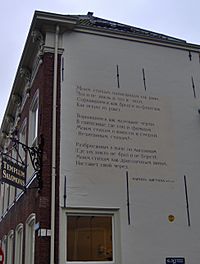
Marina's last ten years in exile, from 1928 until her return to the Soviet Union in 1939, were mostly spent writing prose. This was likely because she needed the money, rather than it being her first choice.
Cultural Impact
- In 2017, an American magazine for Russian speakers, Zerkalo ("Mirror"), had a special issue for Marina Tsvetaeva's 125th birthday.
Music and Songs
The Soviet composer Dmitri Shostakovich turned six of Marina Tsvetaeva's poems into music. Later, the Russian-Tatar composer Sofia Gubaidulina wrote a piece called Hommage à Marina Tsvetayeva using her poems. Marina's poem "Mne Nravitsya..." ("I like that...") was sung by Alla Pugacheva in the film The Irony of Fate.
In 2003, an opera called Marina: A Captive Spirit, based on Marina Tsvetaeva's life and work, was performed in New York. The music was by Deborah Drattell and the story by poet Annie Finch. Many Russian bards (singers and poets) have also set Marina Tsvetaeva's poetry to music and perform them as songs. In 2019, American composer Mark Abel wrote Four Poems of Marina Tsvetaeva, which was the first classical song cycle of her poems translated into English.
Tribute
On October 8, 2015, Google Doodle celebrated her 123rd birthday.
Images for kids
See also
 In Spanish: Marina Tsvetáyeva para niños
In Spanish: Marina Tsvetáyeva para niños
 | Aurelia Browder |
 | Nannie Helen Burroughs |
 | Michelle Alexander |


